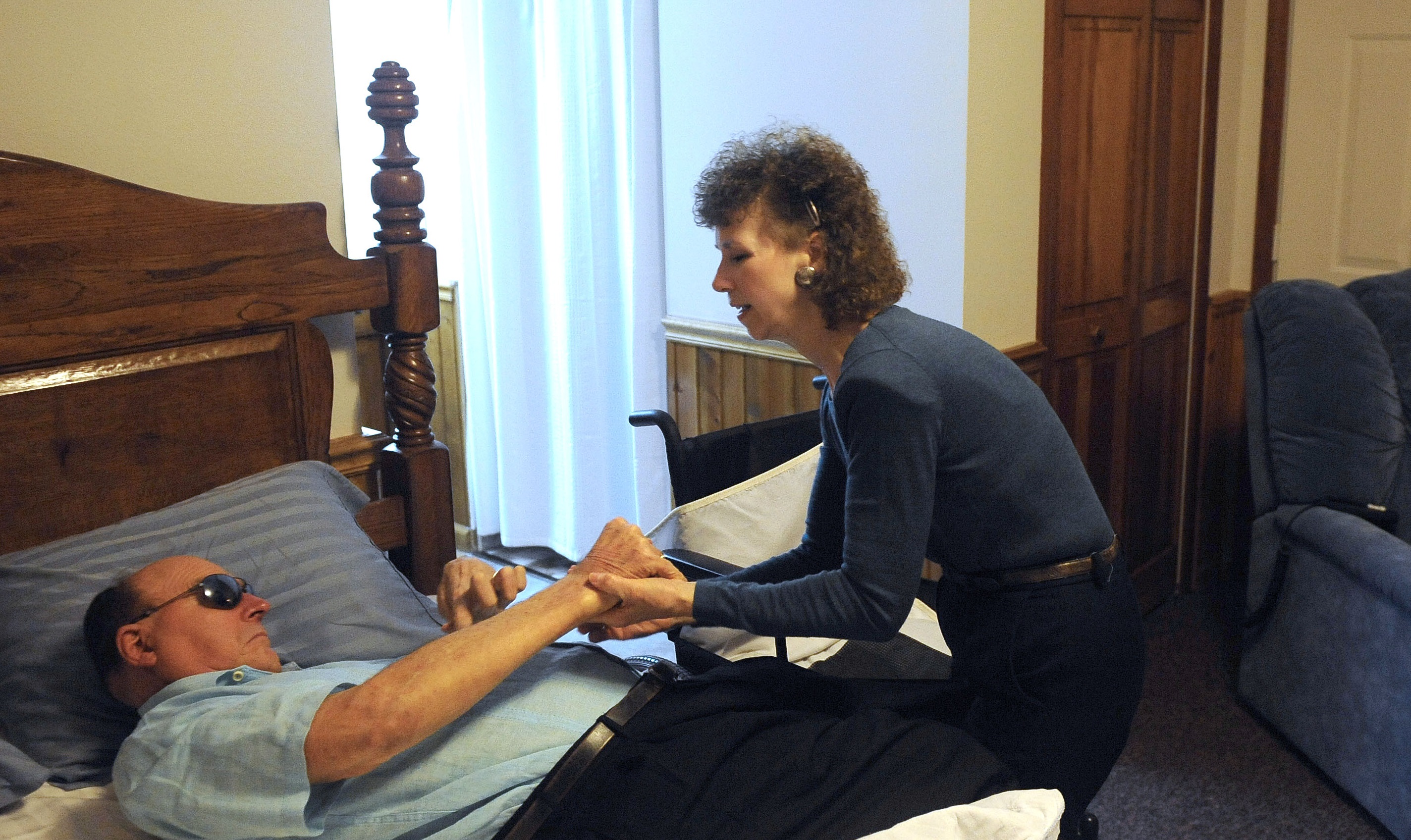
Pauline King, 59, cares for her husband Jerry King, 63, at their home in Anna, Ill., Friday, August 30, 2013. Jerry was diagnosed with Multiple Sclerosis in 1978. He can no longer go to the bathroom, bathe or dress himself without assistance from Pauline. (AP Photo/Stephen Lance Dennee)
Person-centered care is an approach to health care and supportive services in which care is directed by the individual needing care and allows him or her to identify their goals, preferences, and desired outcomes in an effort to improve their overall quality of life. However, there is no single approach to providing person-centered care. As government agencies and health care providers work to design and integrate person-centered care into long-term care planning, understanding older adults’ attitudes toward different approaches is important for developing and communicating these concepts.
The Associated Press-NORC Center for Public Affairs Research, with funding from The SCAN Foundation, conducted a survey of adults age 40 or older, which measured attitudes toward person-centered care policies. The survey shows that there is widespread belief that such policies will improve the quality of long-term care for those who need it. At least 6 in 10 Americans age 40 or older say each of seven person-centered care proposals would be helpful in improving the quality of ongoing living assistance.
While there is mass support for these policies, the extent of that support differs among demographic groups. For example, women—who make up a larger share of those who have provided long-term care—are more likely than men to say that each of the proposals would be helpful. These differences are highlighted in this issue brief and data interactive.
Access To Servicesꜛ
A proposal to provide access to services in the community that help people continue to live independently was the proposal most commonly cited as helpful in improving the quality of ongoing living assistance. Fully 82 percent of Americans age 40 or older say this would be very or extremely helpful.
- Eighty-six percent of women say it would be helpful, compared with 78 percent of men.
- Eighty-eight percent of Democrats and 86 percent of Independents say this would be helpful,compared with 74 percent of Republicans.
Focus On A Person’s Quality Of Lifeꜛ
Seventy-seven percent of Americans age 40 or older say ensuring that all care is focused on the person’s quality of life as well as length of life would be at least very helpful in improving long-term care quality.
- Eighty-two percent of women say it would be helpful, compared to 71 percent of men.
- Eighty percent of those who have experience with ongoing living assistance—either as a caregiver,recipient, or financer of care—say it would be helpful compared to 73 percent of others.
Providing Affordable Care Programsꜛ
Three-quarters of Americans age 40 or older say providing affordable care programs that give the family caregiver the opportunity to take breaks from caregiving would be helpful.
- Women are more likely than men to say it would be helpful (83 percent vs. 67 percent).
Time Away From Work For Family Membersꜛ
Seventy-two percent of Americans age 40 or older say letting a family member take time away from work or adjust their work schedule to provide ongoing living assistance without penalties from their employer would be helpful in improving the quality of care.
- Seventy-seven percent of women say this would be helpful, compared with 65 percent of men.
- Democrats (79 percent) are more likely than Independents (70 percent) and Republicans (64 percent) to say this would be helpful.
- Adults age 40-64 (76 percent) are more likely than those 65 or older (62 percent) to view it as helpful.
- Non-Hispanics (73 percent) are more likely than Hispanics (60 percent) to say it would be helpful.
Personal Goalsꜛ
Nearly 7 in 10 Americans age 40 or older (68 percent) say taking into account the individual’s personal goals and preferences during all aspects of ongoing living assistance would be helpful in improving it.
- Women are again more likely than men to say it would be helpful (72 percent vs. 63 percent).
Designating A Caregiverꜛ
Sixty-five percent of Americans age 40 or older say designating a caregiver on the medical chart as someone who must be included in all discussions about care would be helpful in improving the quality of ongoing living assistance.
- Seventy percent of women say this would be helpful, compared with 60 percent of men.
- Adults age 40-64 (69 percent) are more likely than those 65 or older (58 percent) to say it is helpful.
Assigning A Single Case Managerꜛ
Sixty-two percent of Americans age 40 or older say assigning a single case manager who can coordinate all aspects of the person’s care would be helpful.
- Women are more likely than men to say it would be helpful (67 percent vs. 56 percent).
- Sixty-six percent of those with long-term care experience say this would be helpful, compared with 57 percent of those without such experience.
Concern With Aging And Person-Centered Careꜛ
Concern with aging is also associated with beliefs that person-centered care would help improve the quality of ongoing living assistance. For example, those who express concern with losing their independence, being a burden on their family, and leaving debts to their family are more likely than those who hold little or no concern to say each of the proposals would be helpful.
Methodologyꜛ
This survey was conducted via telephone with 1,419 adults age 40 or older by the Associated Press-NORC Center for Public Affairs Research between the dates of March 13 through April 23, 2014. The overall margin of error was +/- 3.6 percentage points, including the design effect resulting from the complex sample design. A full description of the methodology and topline with question wording is available at www.longtermcarepoll.org.
